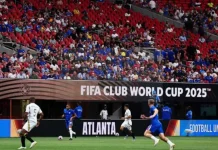Hosting the FIFA World Cup is no small matter; it demands a country’s infrastructure at its peak level. An important component of such infrastructure is an urban transportation system that is sound and effective. With all its gigantic ambitions and massive resources, Saudi Arabia does come across a set of specific problems, among them dealing with traffic congestion resulting from a lack of good urban planning. All these reasons make the country not suitable to host the FIFA World Cup in 2034.
Current Traffic Congestion Issues
Saudi Arabia’s main cities, such as Riyadh, Jeddah, and Dammam, are already congested due to heavy traffic. Often, the current infrastructure of roads cannot accommodate the level of vehicles, thus delays, pollution, and deterioration of the quality of life ensue. An event as massive as the FIFA World Cup would multiply such strain on the systems in these cities.
Statistics of Traffic Congestion
The Middle East’s most congested metropolitan cities according to TomTom’s Traffic Index include Riyadh, which ranked near the top. The average rush hour delay per trip will be around 30 minutes to 45 minutes of travel in Riyadh. To make things worse, tens of millions of fans must travel both to and in host cities, thus spreading these delays exponentially across urban areas for locals and fans alike.
Bad Public Transport Network
One of the major causes of traffic congestion in Saudi Arabia is its underdeveloped public transportation system. Until recently, cities like Riyadh relied nearly exclusively on private vehicles to commute. Although projects such as the Riyadh Metro are under construction, they have not yet been operational at a scale that would suffice for the influx of visitors for the World Cup.
In 2023, bus passengers of public transport were up by 176%, reaching more than 113.5 million passengers inside cities and about 4.1 million for outside city travel1. The figure follows a big hike in 2022 with bus passengers at about 43.5 million an increase of 234% compared to 2021.
Problems with Current Projects
- The Riyadh Metro, promising though it may be, has already suffered from delays and cost overruns. Whether it will be ready to carry its full load by 2034 is anyone’s guess.
- Public buses are available but sparse, not reliable, and underused because of the cultural predilection for private transportation.
- Millions of fans will be forced to travel through already-congested road networks if there isn’t a public transportation system that works.
Car-Centric Urban Planning
Historically, Saudi Arabia’s urban development has been car-centric, with wide highways, sprawling suburbs, and few pedestrian-friendly spaces. The design philosophy has long been to favor private vehicles over public or alternative modes of transportation, leaving its cities ill-equipped to cope with mass transit demands.
Implications for the FIFA World Cup
Efficient mobility within and between stadiums, fan zones, hotels, and airports will be of major importance in the FIFA World Cup. Without alternative public transportation, such as train or tram lines, it would cause bottlenecks, delays, and generally unpleasant experiences for attendees.
Comparative Comparison
Successful hosting of the World Cup was done by famous nationals, including Germany in 2006 and Russia in 2018, which had invested in integrated public transport systems such as high-speed trains, metro networks, and shuttle services. In Saudi Arab, car transport is relied on; thus, it does not deliver similar convenience and efficiency in transport.
High Vehicle Dependent
Saudi Arabia is one of the countries with the highest car ownership rates globally. There are about 541 vehicles per 1,000 people in Saudi Arabia. This heavy use of cars is matched with a lack of regulation of carpooling or shared transport in the country. The end result is that there are a huge number of single-occupancy vehicles on the road, and this will only increase during the World Cup.
Effect on Visitors
Fans from all over the world may not be so ready for touring cities that were basically built with the requirement for car travel while getting about a city. They would find it difficult to get parking, get familiar with the unknown road system, and deal with congestion. This might lead to lower attendance and a blemished overall experience of the event.
Scarce Pedestrian and Cycle Facilities
Cities with good design in pedestrian and cycling infrastructure can support the FIFA World Cup and other large sporting events. These improve environmentally friendly mobility while lowering dependence on motorized travel. Saudi cities do not have enough sidewalks, bike lanes, and pedestrian crossings.
High Tourist Inflow
Hosting the FIFA World Cup attracts millions of international tourists, and even in most cases, the numbers of visitors surpass the number of people living in that host city. Transport structures in Saudi Arabia have none of these capacities now.
Environmental Impact of Increasing Traffic
Traffic congestion is very much an important issue in respect of environmental effects. The hosting requirement of FIFA includes sustainability. Saudi Arabia is majorly dependent on fossil fuel-based vehicles and the influx of traffic that is envisioned to occur during the period of the World Cup shall cause a phenomenal increase in carbon emissions contrary to what FIFA has in mind for the environment.
Disrupting the Day-to-day Life of Locals
Hosting the FIFA World Cup would eventually disrupt the daily activities of Saudi locals. It would be very difficult for locals to move to work, school, or any other important task with roads congested by tourists. This would result in bad public feelings and mar the whole experience of the tournament.
Conclusion
Poor planning in the urban area is always the main cause of traffic congestion, which becomes an impasse to the 2034 FIFA World Cup dream of Saudi Arabia. It mainly relies considerably on car-based designs; public transportation systems are much underdeveloped, although it has a high dependency on vehicles. Saudi Arabia opens up its doors to large project investments, but the issues of time, cultural, and environmental concerns become a no-go area in hosting the World Cup event.













